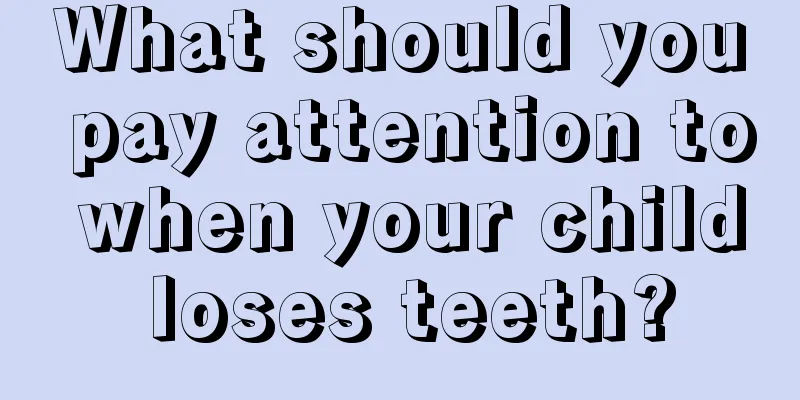What should you pay attention to when your child loses teeth?

|
Only by having healthy teeth can you ensure a normal diet. We all know that children will have a tooth replacement period at around six years old. However, special attention must be paid during this period, otherwise the teeth that grow out of the child will be deformed, and it will be particularly easy to have toothaches and other phenomena in the future. It will also affect the appearance of the teeth. Therefore, parents must pay special attention when children lose their teeth. Let's learn about what we should pay attention to when children lose their teeth. What should you pay attention to when your child loses teeth? Physiological care 1. Pay attention to whether the deciduous teeth are retained or lost prematurely. There is a certain time and order for the shedding of deciduous teeth. Deciduous teeth that should fall out but don't are called retained deciduous teeth, and the consequence is often that permanent teeth cannot erupt in the normal position. The most common situation is that the lower front permanent teeth grow on the inside of the deciduous teeth, and the upper front permanent teeth grow on the outside of the deciduous teeth, making it look like double teeth. What should you do in this situation? You should take your child to the hospital as soon as possible to remove the retained deciduous teeth and make room for the permanent teeth to erupt. If the deciduous teeth fall out before they should, it is called premature loss of deciduous teeth. This often causes the adjacent teeth on both sides to tilt toward the gap between the missing teeth, making the gap smaller and causing the permanent teeth to erupt out of place due to insufficient space. At this time, a space maintainer (custom-made by the hospital's dental department) should be placed in the gap between the deciduous teeth to prevent the teeth on both sides from tilting, so as to maintain the proper eruption position of the permanent teeth until the permanent teeth erupt. 2. Pay attention to whether there is difficulty in the eruption of permanent teeth. If the deciduous teeth fall out prematurely, the child will get used to chewing and licking with the gums, which will become thick and tough, hindering the eruption of permanent teeth. Therefore, if your child has reached the age of replacing teeth but the permanent teeth have not yet grown, you should take your child to the hospital for examination in time to get the doctor's help. Calcium deficiency in children is also an important reason for the delayed eruption of permanent teeth. Parents should supplement their children with calcium in time. 3. Pay attention to the cleanliness of your child’s oral cavity. During the tooth replacement period, deciduous teeth and permanent teeth coexist. The permanent teeth have just erupted, especially the "six-year teeth" which are the "key to occlusion". They are large in size and have many pits and fissures on the occlusal surface, which easily retain food residues. In addition, most children do not like to brush their teeth and like to eat sweets, so caries often occur. Once it occurs, it should be treated early. The most important thing at this time is to teach your child to brush their teeth correctly. 4. Pay attention to correcting children’s bad habits. During the tooth replacement period, when the deciduous teeth are loose and about to fall out, children often have the habit of licking the loose teeth with their tongues. This is a bad habit that will affect the normal eruption of permanent teeth and should be corrected in time to prevent malocclusion, that is, uneven teeth arrangement. 5. During the tooth replacement period, children's teeth are replaced, the jaws are developing, and the bite relationship is gradually established. Sometimes a temporary misalignment of the bite may occur, but during the development of the teeth, it can often adjust itself and return to normal. Some malocclusions, such as when the frenulum of the upper lip is too low, causing the gap between the upper front teeth to be too large and cannot be adjusted by itself, will affect facial development. You should go to the hospital for diagnosis and treatment, otherwise it will affect the child's appearance. Psychological care Children's self-esteem has been established during the tooth replacement period. Although they don't say it, they care a lot about whether their front teeth look good or not. If you tease your child in this way, he or she will develop an inferiority complex and may even lick his or her teeth desperately hoping they will grow out faster, but this will have the opposite effect. You can tell your children that white swans are transformed from ugly ducklings. The loss of front teeth and ugly appearance are a process of transformation, proving that "you are growing up soon", and every child must go through this process when growing up. Nutrition and Diet As children grow older, they should eat more chewy foods such as jellyfish, peanuts, sugar cane, spiced beans, etc. to maintain a good stimulation effect on the deciduous teeth and promote the shedding of deciduous teeth on time. When the child is about 10 years old, the front incisors and back molars have erupted, and parents can add some celery stalks, corn, apples and other foods to them to ensure a smooth tooth replacement and give the child a healthy and neat permanent tooth. Children need to be rubbed before their teeth change. Children should eat more chewy foods during their teeth change period. Other related information The above is an introduction to what you should pay attention to when children lose their teeth. After understanding it, you must pay special attention to the diet of your child during the period of tooth replacement. Do not eat too sweet food. In addition, you must maintain good living habits, do not always lick your teeth with your tongue, and pay attention to calcium supplementation in the diet during the period of tooth replacement. |
<<: What are the reasons for baby tooth loss?
>>: How to treat tooth decay in children
Recommend
Is a neonatal jaundice value of 15 serious?
If the jaundice value of the newborn is 15, it is...
What should I do if my child has a runny nose?
Children have relatively poor resistance and ofte...
What to do if your baby has a red birthmark
In recent years, the incidence of birthmarks has ...
What should infants and young children eat to be nutritious?
Infants and young children refer to children unde...
How to treat children's hallux valgus?
The condition of clubfoot can be discovered after...
What are the good foods for children to eat to supplement calcium?
Calcium supplementation is what parents are most ...
How can infants and young children eat walnut oil more healthily
Infants and young children need to add a small am...
Causes of low creatinine in children
Low creatinine in children is mostly caused by ma...
Newborn baby's nasal breathing problem
For adults, a blocked nose is generally not a cau...
Causes of frequent parotid gland swelling in children
Mumps is mainly an inflammation of the parotid gl...
Newborn baby face red spots
If a newborn baby has some red spots on his face,...
Can six-month-old babies eat grapes?
Grapes are sweet and sour and rich in nutrients, ...
Can a one-year-old baby eat papaya?
Papaya has a soft and sweet texture, which is mor...
Why is the baby's belly button red?
Many parents find that their baby’s belly button ...
Why is the inflammation in newborn babies so high?
Parents attach great importance to the physical h...









